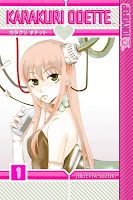 Creator: Julietta Suzuki
Creator: Julietta Suzuki
U.S. Publisher: Tokyopop
ISBN: 9781427814074
Released: September 2009
Original release: 2006
Awards: Hakusensha Athena Newcomers’ Award
I was very excited when Julietta Suzuki’s Karakuri Odette was selected for the January 2011 Manga Moveable Feast. I had seen positive reviews for the series, but hadn’t gotten around to actually reading it yet. Plus, I have a thing for androids and advanced artificial intelligences (which are often, but not always the same thing)—they are some of my favorite tropes when it comes to science fiction. At six volumes Karakuri Odette was Suzuki’s first completed series. The collected volumes were published in Japan between 2006 and 2008 and the series won her a Hakusensha Athena Newcomers’ Award for Outstanding Debut. Tokyopop began the English publication of Karakuri Odette in 2009. So far, five of the six volumes have been released and the final volume is scheduled to be published later this year. After reading the first volume, I’m looking forward to reading the rest of the series.
A few weeks after she was built, Odette convinces her creator, the roboticist Professor Yoshizawa, to enroll her in a local high school. She’s a state of the art android and wants to understand just what the difference is between her and humans. Thinking he might be able to get some good data for his research out of it, Yoshizawa agrees. But her requests don’t stop there and Odette continues to ask for modifications that will make her more human-like. None of the students are supposed to know that Odette is a robot, although that doesn’t last for long; but for the most part, everyone treats her like she’s a normal high school girl. And as Odette learns more about humans, she also learns more about herself and other androids.
No in-depth explanation is given regarding Odette’s creation other than Professor Yoshizawa is a specialist in robotics and that he considers her his masterpiece. He also appears to find her useful to have around, but no details are really given about that, either. Personally, I would have liked to know a bit more about Odette’s development. While I found Suzuki’s artwork and character designs in Karakuri Odette to be appealing, I don’t think I would describe them as particularly stunning. However, she has done some really nice things with the art. Odette’s eyes and subdued facial expressions visually set her apart from her classmates, but the effect is marvelously subtle. Suzuki also is able to capture the good-natured eccentricity of the professor in how he dresses and behaves—an aspect of his character that isn’t immediately obvious from dialogue alone. And both his and other characters’ (especially Asao’s) frequently over-the-top reactions are a lot of fun to see.
Although there is nothing really new or groundbreaking about the first volume of Karakuri Odette when it comes to robot stories, I still found it to be quite charming and very enjoyable. Suzuki explores what it means to be human and the existence of free will which is fairly standard for the genre and somewhat expected. Even telling the story primarily from the androids’ perspectives, while slightly less common in my experience (although not by much), isn’t that unusual. However, the balance Suzuki strikes between Karakuri Odette’s more humorous elements and the serious nature of the questions it raises is utterly delightful. The story never gets too heavy, but neither is it ever too silly. Odette is closer to being human than she knows and doesn’t realize that some of the things that distinguish her as an android also help define her as a decent person. That right there is probably one of the reasons I enjoyed Karakuri Odette as much as I did and why I’ll be following the series to the end.
